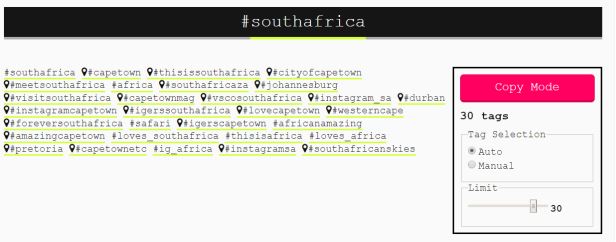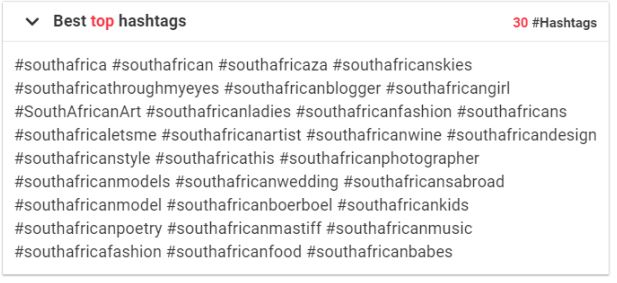Across various social media platforms, the hashtag functions in a similar fashion: include a hashtag to mark your post for a particular topic (it might sound intimidating, but
you need to be brave and take risks).
In South Africa, the three top platforms are Pinterest, Facebook, and Twitter — in that order, surprisingly enough, with
Pinterest apparently having overtaken Facebook in early 2019.
If you’re looking to get the most from trends, how do you find the most popular regional hashtags?
Here are some tips for each platform:
1. Pinterest hashtags
With how Pinterest functions — passing traffic back and forth through Pins — the simplest and easiest way to find content relevant to South Africa is to do a main search for 'South Africa' and start clicking into the top pins. However, that might not help with hashtags because they’re not used that commonly.
To find Pins that do use hashtags, try #SouthAfrica instead. When someone uses one hashtag, they’re likely to use others, and by clicking into the Pins, you can find others along the same theme then follow them to find more Pins and more hashtags (e.g. #capetown or #southafricatravel).
Keep in mind that you can change the search from 'All Pins' to 'People', which can be helpful for finding content on specific topics — simply find a person in the results who concentrates on the topic you’re looking for and follow their Pins.
Note that Pinterest — being a visual platform — is always heavily weighted towards products and tourism, so don’t expect miracles. If your focus happens to be on products because you’re running an e-commerce store (easily done in South Africa through combining a store platform like
Shopify with a shipping management service like
UAfrica), then look for similar stores, review their Pinterest activity and find ways to outperform them.
2. Facebook Hashtags
Facebook somewhat limits your options for finding hashtags because of the privacy of some posts (many only being accessible to friends). You can still manually trawl through posts of pages you follow, and business pages are fair game so look for South African businesses to follow and see what they talk about.
For an in-depth look at hashtags on Facebook, you’ll need to take advantage of
tools such as these. They’re ostensibly for Instagram, but it’s owned by Facebook. Plus, there’s a huge amount of hashtag crossover between platforms.
Let’s use For Display Purposes Only as an example: once again, put in #SouthAfrica (a very broad local tag), and you’ll receive a set of similar tags such as #meetsouthafrica or #africanamazing.
 Image sourced from Display Purposes Only
Image sourced from Display Purposes Only
In the list below the initial results, you’ll see hashtags ranked by relevance and popularity. If you find a term that really suits what you’re going for, you can feed it back into the search to hunt down more niche terms in that area.
3. Twitter hashtags
Twitter hashtags are by far the easiest to find because they’re so accessible. Not only does Twitter display a feed or trending topics, but posts are visible to everyone by default, so you can easily search a vast range of posts for inspiration.
Even something as basic as searching the web for South African influencers can be fruitful: if you were looking to promote fashion,
these influencers would be of great interest.
Plenty of the main hashtag tools are paid services, but 'All Hashtag' is completely free, so I suggest you give it a try. Enter '#southafrica' and select the 'top' option, then click 'Generate': you’ll receive a huge range of suitable hashtags.
They won’t be marked for popularity, but that isn’t a big deal — simply note down the ones that might suit your needs, then manually search for them on Twitter and see how many results come up.
 Image sourced from All Hashtag
Image sourced from All Hashtag
If a hashtag gets a lot of results, or a few results from prominent sources or in posts with a lot of engagement, then it’s evidently worth targeting. However, be mindful of dates. A hashtag that saw a lot of use several years ago might be useless today.
For more information, visit
www.mircrostartups.org. You can also follow MicroStartups on
Facebook or on
Twitter.